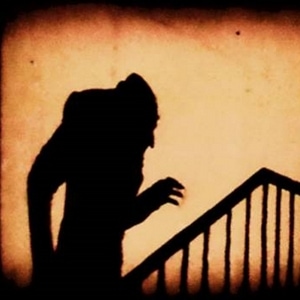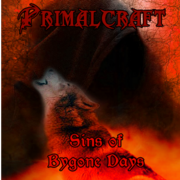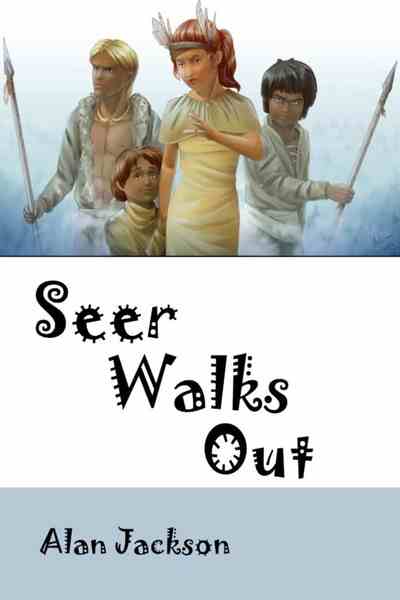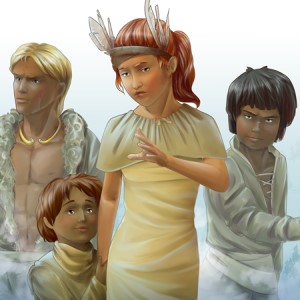The path ran diagonally across the slope, through gorse bushes that grew more and more stunted the higher we climbed. It was too open for me; I began to feel there were eyes, out there, watching me climbing. Then suddenly the path turned sharply back, still climbing but crossing the slope on the other diagonal. There was no more rain; instead, there was…
“Snow!” exclaimed Hawk. “Snow – in autumn!”
For me this was exciting; I’d only seen snow three or four times in my whole life. I couldn’t understand why Hawk and Stack weren’t excited too.
Hawk looked at me. “Oh sure,” he said. “It’s fun to play in. But we’re not playing. It’s hard walking, very very hard.” He clicked his tongue. “I remember two years ago. You lot were playing snowballs in camp, we were out trying to feed you. And wading through snow almost up to our knees.”
“Almost up to our loincloths,” added Stack.
“You were a lot smaller then,” I laughed. I tried to make a snowball, but it melted in my hand.
“You wait,” said Stack. “You just wait.”
The path crossed back and forth across the slope, and the snow began to fall more steadily, so that we could see only what was around us; the crest of the hill was lost completely in the dull grey. At last I was walking over lying snow, getting little cold icebergs squeezed between my toes. It still wasn’t too unpleasant, though. Yes it was cold on face and knees and feet, but my cloak kept me warm enough, and the snow didn’t soak as the rain had done; it just bounced and dropped off.
But after an hour’s walking there were no more sharp bends. The path began to wind more, and the slope, which was upwards to our right, that seemed shallower. And my cloak wasn’t keeping out all of the chill any longer. I began to fret a little. How long could this go on? How high was this hill? We must already be far higher than anything in the Longwood lands. Are there hills that go on for ever?
Then a black shadow loomed in front of us in the falling snow, and resolved itself into a high crag. Stack stopped us.
“This is like something out of a Singer’s tale,” he murmured. “There might be anything hiding in these crags. Let me go first.”
I wasn’t going to disagree.
The path went right up to the base of the crag and turned right, close under the rock – so close that the rock sheltered us from the snow. The crag wound round, and the path wound with it, over rocky steps and between fallen boulders, until it widened out across a rock platform and around a shoulder.
A gale blasted me as I stepped round that shoulder. It ripped the cloak from my body, snapping the tie – only my pack strap held the cloak long enough for me to grab it – and the instant it left, the snow and freezing wind sucked every trace of heat from my bare body. On my hands and knees, my cloak and my pack a tangled mass in front of me, I crawled back behind the shoulder of rock, my naked skin burning with the cold. The instant I crawled back round the rock the wind dropped, and I collapsed breathless onto the bare slab.
The others were in no better state.
“At least you’ve got loincloths,” I said. “All I’ve got are two thin straps. Believe me, they’re no protection at all.”
Actually I had six thin straps; one under each knee, one above each elbow, one round my waist and one round my head; seven if you count the pack strap. The feathers had blown straight out, of course, but my pouch was still on my waist strap. I undid them all, put my pouch in my pack, did a quick, crude repair on my cloak tie, put my cloak back on, tied my head strap round the hood and across my forehead, tied my waiststrap around my waist outside the cloak – I had to wrap the cloak round me very tightly to get it to reach – and then joined the other four together and tied them round the cloak around my hips. Finally I put my head and arms through my pack strap and brought the pack back over my head to rest on my chest.
Meanwhile the boys were reconstructing their own clothing, using slings, loincloths, spearthongs, anything to hand.
We were still chilled to the bone, of course; the air was bitterly cold even out of the wind. We tried huddling together in a corner, but our feet were so cold we were beginning to lose feeling in them.
“We can't stay here,” I said.
“We go on or turn back,” said Hawk.
“On,” said Stack.
We tried to go on; we really did. We walked round that shoulder again, packed as close together as we could, gripping our cloaks closed, but the wind made it almost impossible even to see the path under our feet. We pushed forward maybe ten paces, and the wind dropped a little as we did; but then snow covered the path. Then Stack stepped into nothing; his foot went right through the snow and was hanging in the air. We grabbed him and held him as the snow crumbled away around him; his other leg slipped too and he was hanging by our arms over an unknown drop.
We pulled him back onto the path, but that was enough. Half carrying Stack between us, we fought our way back over the crest, and down the long, slow, sheltered path to the bowl in the hillside.
Hawk managed to kindle a fire. I gathered some handfuls of soft twigs and beat and rubbed Stack’s legs and feet, trying to get some circulation going. The heat from the fire stung, but slowly the colour came back, even to Stack’s legs. I had never experienced such cold, but I had been told about such cold, and I reckoned we’d all had a very narrow escape. If we lived through the night, that is.
We built ourselves a burrow from cloaks and gorse branches – weird, but the spikes weren’t sharp enough to get through even one deerskin cloak. We tried to roof it with ferns and leaves, but there weren’t enough, so we piled on as many gorse branches as we could. When we finally crawled inside, three chilled bodies huddling together inside three cloaks, we could only hope for the best.
When we woke up in the morning, we were warm; warm and snug in a grey world. Snow covered our burrow, far enough above us not to melt and soak us, close enough above us to hold all our warmth in. Slowly we uncoiled; slowly we each wrapped ourselves in a cloak; slowly we crawled out of our burrow into a white world under a grey sky.
The wind was blowing up the slope on our side, and was no more than a breeze. The air was far less cold than yesterday, although it still had a chill bite.
We tied our cloaks and packs around us, and set off. The path was snow-covered, but always easy to trace, and not slippery either, so we made good time. When we got to that rocky shoulder we all paused to check our clothes, but there was no need; if anything, the breeze dropped as we rounded it, and most of the snow had blown off the path down. I could see where Stack had broken through, though; the path did a sharp turn back on itself and Stack had obviously stepped on forward, past the point of the elbow. He would have fallen six feet or so onto a snowfield, so he wouldn’t have died instantly, but how could we ever have got him back up?
“The Spirits are with us,” said Stack, looking me in the eye. “We lost no cloaks when the wind blew them off us, they kept me safe here where I stepped through the snow, they protected us through the night.”
I saw no reason to pass up such an opportunity! “Thanks to my knowledge, we have treated them with respect,” I answered. “We asked their permission to stay in the deserted camp. We respected the holy place. And most of all, you respected their holy place.” I took Stack’s hand, and he nodded. “You were kept safe at this corner because you respected their dwelling.”
“This is a tale we should tell,” he replied. “Praise the Spirits.”
I had begun to realise that Stack has these attacks of superstitious piety; they fit oddly with the rest of him. Never mind; they give me control, which is what matters. Except, as I promised Speaker, I’m not trying to control them any more. Of course not.
“Truly, let the Spirits be praised.” I responded. Definitely a win for me, I felt.











Comments (0)
See all